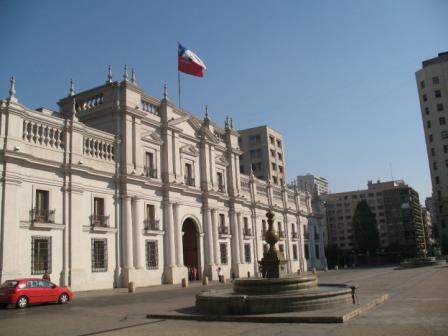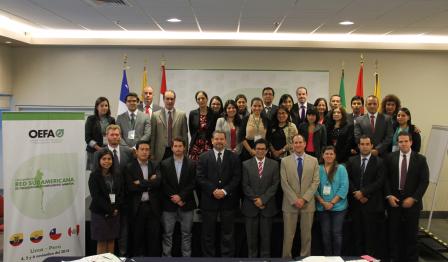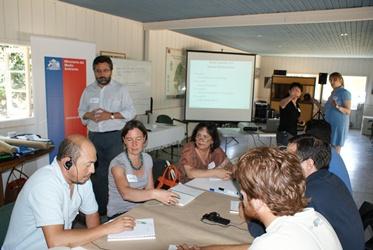EPA Collaboration with Chile
 La Moneda, the Chilean Presidential Palace.The U.S.-Chile Free Trade Agreement entered into force in January 2004. Recognizing the importance of protecting the environment while promoting sustainable development, the Governments negotiated an associated Environmental Cooperation Agreement, which is the basis for our environmental cooperation. As a global partner in trade and the environment, Chile is a priority country for U.S. environmental cooperation.
La Moneda, the Chilean Presidential Palace.The U.S.-Chile Free Trade Agreement entered into force in January 2004. Recognizing the importance of protecting the environment while promoting sustainable development, the Governments negotiated an associated Environmental Cooperation Agreement, which is the basis for our environmental cooperation. As a global partner in trade and the environment, Chile is a priority country for U.S. environmental cooperation.Explore our work with Chile:
Highlights
August 2016: Chile’s Environment Superintendency hosted a successful workshop on Continuous Emissions Monitoring Systems (CEMS), which measure compliance with air pollution standards. The goal of the workshop was to strengthen skills and capacity for over 80 professionals who use CEMS to measure fulfillment of their environmental obligations. The workshop was delivered by experts from Eastern Research Group, through an agreement with EPA.
August 2016: With EPA support, Chile’s Environment Superintendency (SMA) hosted a conference on “New Approaches on Environmental Enforcement” as a joint activity between the Chilean national enforcement network (RENFA) and the South American Environmental Enforcement Network (REDSuFiCa). The meeting brought together over 100 participants from SMA and other ministries to learn about the appropriate use of Next Generation Compliance tools to discover and correct violations in multiple industrial sectors. Participants included REDSuFiCa members from Peru, Colombia, and Brazil.
April 2016: Representatives from EPA and the Department of Justice presented at the “First Workshop on Environmental Forensics” hosted by the Santiago Environmental Tribunal and the Chile Center for Environmental Law. The meeting brought together local and international experts to discuss environmental crimes, focusing on procedures to collect samples and other types of forensic evidence for use in court procedures.
August 2015: OITA staff delivered a successful one-day workshop regarding Public Participation in Environmental Decision Making to representatives of Chile’s Ministry of Environment in Santiago, Chile. Based on EPA’s Public Participation Guide, the workshop provided participants with tools to identify best practices for planning, skills and behaviors so they can design and implement a meaningful public participation program.
August 2015: EPA, with Chile's Superintendence of the Environment (SMA), delivered two courses on the collection and use of forensic evidence of environmental violations in Santiago and Valdivia, Chile. The objective of the courses was to strengthen the capacity of representatives of the various agencies that undertake enforcement and compliance activities. Attendees included inspectors from Chilean ministries, members of the environmental tribunals, and enforcement officials from Peru and Colombia.
- Learn more: “SMA organizes international course on environmental enforcement in Valdivia” Exit(Spanish)
Activities
Environmental Governance
- Development of curricula for judges on adjudicating environmental enforcement cases
- Training the Environment Superintendency (Superintendencia del Medioambiente- SMA) inspectors on inspection and enforcement
- Technical consultation and assistance on a variety of environmental enforcement issues as needed
- Deployment of NEPAssist, a tool that facilitates the environmental review process and project planning in relation to environmental considerations
 EPA participated in the annual meeting of the South America Environmental Enforcement Network. (2014)
EPA participated in the annual meeting of the South America Environmental Enforcement Network. (2014)This work has produced the following selected results:
- EPA and DOJ held the first ever workshop on adjudication of environmental enforcement cases for Chilean Supreme Court Justices.
- As a result of EPA cooperation with Chile’s Environment Superintendency (SMA), trainers previously trained by EPA have provided inspection training to 520 inspectors across Chile.
- SMA has also adopted a total of 7 new policies/protocols in the following areas:
- Inspections of liquid wastes;
- Inspection procedures at thermoelectric plants;
- Protocols for the use of Continuous Air Emissions Monitoring;
- General enforcement procedures;
- Penalty calculation methodology;
- Inspection planning procedures; and
- Policy on coordination with other sector ministries during inspections.
- NEPAssist was deployed in Chile Exit in March 2014.
- Chile has shown its regional leadership as a founding member of the South American Environmental Enforcement Network. Exit
Mining
- Management of environmental aspects of mine closure
- Abandoned mine risk evaluation
- Remediation of contaminated mining sites
This work has produced the following selected results:
- Participants from a variety of Chilean government entities were trained on financial assurance mechanisms in mining.
- Representatives from over 10 Chilean entities participated in an environmental risk assessment in mining seminar in Santiago, Chile.
- Representatives from 15 Chilean entities were trained on regulatory structure, characterization, risk assessments, mapping, selection of remedial options and enforcement measures at mining sites.
Public Participation
- Over 60 Chilean representatives were trained in involving the public in environmental decision making.
- 28,000 public guides for access to environmental information were disseminated.
- EPA's Public Participation Guide was translated into Spanish.
Environmental Education
 Chilean environmental education workshop. (2013)
Chilean environmental education workshop. (2013)Agreements and Relevant Documents
- U.S.-Chile FTA
- Environmental Cooperation Agreement (PDF)
- 2015-2017 United States - Chile Work Program for Environmental Cooperation
Key Partners
The following links exit the site Exit
| US Department of State | Chile Ministry of Foreign Relations |
| Chile Ministry of Environment | Chile Ministry of Mining |
| Chile Superintendencia del Medioambiente |
